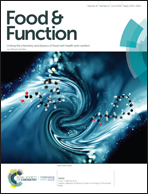Safflower (Carthamus tinctorius L.) seed attenuates memory impairment induced by scopolamine in mice via regulation of cholinergic dysfunction and oxidative stress
Abstract
Cholinergic dysfunction and oxidative stress are the most common causes of Alzheimer's disease (AD). Safflower seed contains various anti-oxidant and cholinergic improvement compounds, such as serotonin and its derivatives. In the present study, we investigated the protective effects and mechanisms of a safflower seed extract on scopolamine-induced memory impairment in a mouse model. The safflower seed extract was orally administered at a dose of 100 mg kg−1 day−1, and then behavior tests (such as T-maze and novel object recognition tests) were conducted. Acetyl cholinesterase (AChE) activity, reactive oxygen species (ROS) production, and antioxidant enzymes in the brain were measured. In behavior tests, the novel route exploration and object recognition were improved by the administration of the safflower seed extract, which suggests that the safflower seed extract improves memory function in the scopolamine-treated mouse model. In addition, the safflower seed extract-administered group showed inhibition of the AChE activity and improved cholinergic dysfunction. Furthermore, the administration of the safflower seed extract resulted in lower ROS production and higher antioxidant enzyme levels as compared to the scopolamine-treated group, suggesting the protective role of the safflower seed extract against oxidative stress. The results of the present study suggest that the safflower seed extract improves scopolamine-induced memory deficits via the inhibition of cholinergic dysfunction and oxidative stress. Therefore, safflower seeds might become a promising agent for memory improvement in AD patients.



 Please wait while we load your content...
Please wait while we load your content...